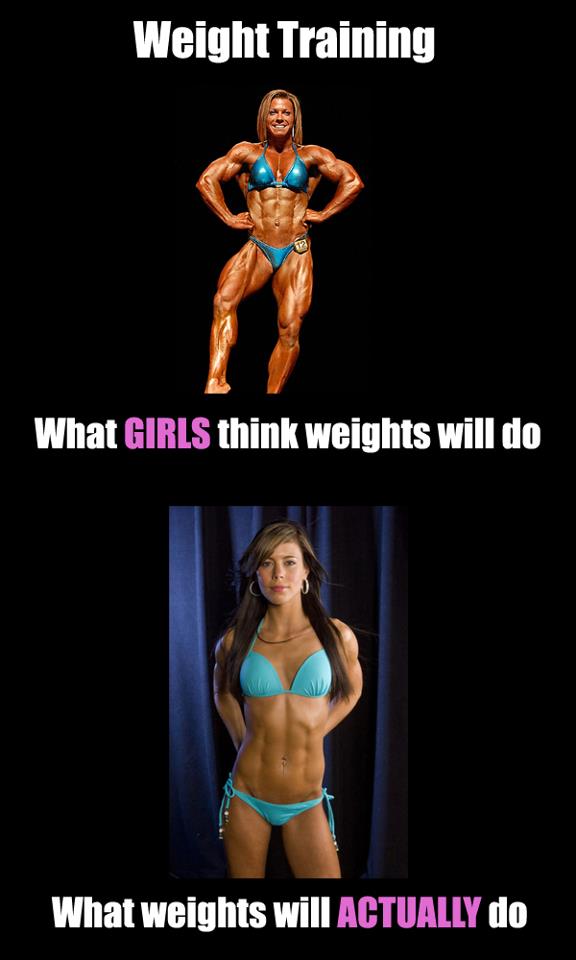Welcome to Debate Club! Please be aware that this is a space for respectful debate, and that your ideas will be challenged here. Please remember to critique the argument, not the author.
We are pleased to announce that on March 4, 2025, an updated Rich Text Editor will be introduced in the MyFitnessPal Community. To learn more about the upcoming changes, please click here. We look forward to sharing this new feature with you!
Should women lift heavy?
Replies
-
Traveler120 wrote: »cwolfman13 wrote: »Need2BFitAgain wrote: »


And even then you're talking about spot on nutrition and very solid and specific programming...awesome genetics and years of work.
I know tons of women who lift and very few look like this even...
Good point. And if that's true, then indeed, why should women lift heavy if chances of looking like girl #2 & 3 are slim to none? Why risk disk degenerative disease, various injuries like busted shoulders and knees, and as I'm learning on this thread, uteruses falling out? Sounds like a lot of unnecessary risk.
You pick and choose your risks. You may not look exactly like these women, but many find they look awesome in their own bodies and the risks are worth it. Not lifting carries the unnecessary risk of bone density issues, frailty, increased falls in the elderly, increased PCOS symptoms and insulin resistance, weak joints and ligaments...etc.
I don't lift heavy because I don't like it and I'm very limited to what I'm allowed to do due to spinal issues. This doesn't mean I'm avoiding risk. I might have less risk of busting a shoulder but I'm at a higher risk for insulin resistance which is a real possibility given that I was prediabetic at one point. You judge for yourself and evaluate which route you are willing to walk, accepting the possibility of something unpleasant happening regardless of choice.2 -
diannethegeek wrote: »Yes women should go ahead and lift heavy if they want to.
It's okay if they show their ankles, too.
whoo...slow it down, next you'll think they should be allowed to vote.3 -
amusedmonkey wrote: »Traveler120 wrote: »cwolfman13 wrote: »Need2BFitAgain wrote: »


And even then you're talking about spot on nutrition and very solid and specific programming...awesome genetics and years of work.
I know tons of women who lift and very few look like this even...
Good point. And if that's true, then indeed, why should women lift heavy if chances of looking like girl #2 & 3 are slim to none? Why risk disk degenerative disease, various injuries like busted shoulders and knees, and as I'm learning on this thread, uteruses falling out? Sounds like a lot of unnecessary risk.
You pick and choose your risks. You may not look exactly like these women, but many find they look awesome in their own bodies and the risks are worth it. Not lifting carries the unnecessary risk of bone density issues, frailty, increased falls in the elderly, increased PCOS symptoms and insulin resistance, weak joints and ligaments...etc.
I don't lift heavy because I don't like it and I'm very limited to what I'm allowed to do due to spinal issues. This doesn't mean I'm avoiding risk. I might have less risk of busting a shoulder but I'm at a higher risk for insulin resistance which is a real possibility given that I was prediabetic at one point. You judge for yourself and evaluate which route you are willing to walk, accepting the possibility of something unpleasant happening regardless of choice.
We're talking about lifting "heavy", not resistance training in general. If the goal is overall fitness, strength, bone health and all the other things you listed, plus looking bloody good, then lifting heavy is just not necessary. You know, there is such a thing as moderation. There's a lot of space between the 2 extremes of either heavy lifting or doing nothing.
All those benefits can be accomplished with a more moderate approach like @cwolfman13 described - "low to moderate weights with moderate to high reps and focus on time under tension as well as high volume". And there are many forms of exercise that will achieve this, such as bodyweight training, which poses the lowest risk of injury compared to heavy barbell training. Some of the most amazing bodies have been achieved without the use of heavy barbells/heavy lifting.
1 -
This content has been removed.
-
Now I wonder what everyone's definition of "heavy" is. If I could lift 300 (not there yet) but lifted 200 is that heavy? Or is there a max weight you think people should stop at regardless of their ability and/or potential?
It has to do with what's challenging for a certain number of reps -- 3-5 or something like that -- with the idea that you keep progressing as necessary to keep it challenging. Plus the major compound lifts. A program like SL 5x5 would be lifting heavy, as well as many other things.
I think it's often used more broadly on MFP to just mean lifting weights that are challenging without it becoming basically cardio.0 -
For the record, I saw the question as akin to "should women (and not just men) run marathons." I'd have the same answer -- of course, if they want. Does that mean that it's always the best thing for your health to run marathons? No, it's not, and you should have some idea of what you are doing before just jumping into the training, probably, just like you should learn something about lifting and definitely form. But there's nothing about being a woman that means you should not do it.4
-
Traveler120 wrote: »cwolfman13 wrote: »Need2BFitAgain wrote: »


And even then you're talking about spot on nutrition and very solid and specific programming...awesome genetics and years of work.
I know tons of women who lift and very few look like this even...
Good point. And if that's true, then indeed, why should women lift heavy if chances of looking like girl #2 & 3 are slim to none? Why risk disk degenerative disease, various injuries like busted shoulders and knees, and as I'm learning on this thread, uteruses falling out? Sounds like a lot of unnecessary risk.
None of those things are terribly common. Many of the risks can be moderated further by good form, and thoughtful progression. Nothing is risk-free.
Yes, I noted your distinction elsewhere between "lifting heavy" and "resistance training". Other forms of resistance training also have risks. While lifting low-rep/high-weight may increase some risks vs. more moderate lifting, I'd guess it isn't a huge difference.
Personally, I'm too *green-vegetable* lazy to lift heavy or much at all, because I don't find lifting all that fun. Yet I have a decent amount of both strength and muscle, especially for my age, mainly from rowing a lot. People get hurt rowing: Broken ribs, knee issues, rotator cuff problems, all that jazz . . . even drowning. One poor soul in a single even got his pancreas skewered by a bow-ball in a collision with an eight! Love rowing, gonna do it anyway.
Statistically, I strongly suspect many, many more women suffer injury from doing no strength/resistance training, than suffer injury from lifting too heavy, too often. Even women get to make choices.6 -
Women should lift heavy, but you must treat the weights as if they were a basalisk - no direct eye contact, as that is what causes a woman to instantly supah-bulky. Always use mirrors or through lenses and you'll be safe, otherwise stick to the safe cardio zone, as the supah-bulky virus flees from that area.
I saw a woman contract the supah-bulky once, it wasn't pretty.
She transformed like a werewolf, it was horrifying.
Seriously though. A woman who wants to lift should lift as heavy as she can safely lift. No shame in starting on 5, 10, 15kgs and working from there.10 -
Poor fragile women should def not lift heavy. All sorts of strength & confidence might happen.8
-
Aqua_Sony2012 wrote: »Thoughts?
If they want to. It depends on personal preference and goals. Every woman should do some form of resistance training to preserve bone and muscle, but lifting heavy is not the only way to accomplish that.2 -
Keladelphia wrote: »VioletRojo wrote: »enterdanger wrote: »My ovaries can't handle heavy lifting.
I thought it made one's uterus fall out.
My mom legitimately believes this and reminds me on a regular basis.
It can if there is a uterine prolapse. Running, jumping, lifting heavy objects, most exercise other than walking actually can exacerbate a prolapsed uterus and yes, it can actually come out. Kegels can help, but not always prevent it.2 -
Luckely my wife doesnt have to lift heavy cause I do the cooking :P1
-
*Gasp*diannethegeek wrote: »Yes women should go ahead and lift heavy if they want to.
It's okay if they show their ankles, too.
Smelling salts and a fainting couch ASAP!!!!111111
:laugh:
3 -
I think women should do as they please, same as men.0
-
tl;dr
I used to lift light, now I lift heavy. And heavy for me is heavy for me!
48 years old and still going, don't pry my heavy weights from hands, something might happen to you if you try.3 -
diannethegeek wrote: »HeliumIsNoble wrote: »
Steady on.diannethegeek wrote: »Yes women should go ahead and lift heavy if they want to.
It's okay if they show their ankles, too.

Does she even lift?1 -
As long as you are able to do so and not hurt yourself, why not? What does your gender have to do with it?1
-
If she wants. Not every woman has a need for strength, nor do all women want to get bigger. But as with men, some women want to challenge themselves by seeing how heavy they can lift and they love the physical changes.
What a woman looks like after heavy lifting depends on her body type. There's a myth that everyone slims down. But if you are short and somewhat squat at a normal weight heavy lifting will make you look squatter.0 -
Everyone who is capable of doing resistance training should do lift. There is literally no downside to being stronger, and significant increases in useful lifespan and compression of morbidity as we approach the downward slide of life.1
-
diannethegeek wrote: »HeliumIsNoble wrote: »
Steady on.diannethegeek wrote: »Yes women should go ahead and lift heavy if they want to.
It's okay if they show their ankles, too.

Does she even lift?
She's lifting her skirt, can't you see? ;-)3 -
diannethegeek wrote: »HeliumIsNoble wrote: »
Steady on.diannethegeek wrote: »Yes women should go ahead and lift heavy if they want to.
It's okay if they show their ankles, too.

Does she even lift?
She's lifting her skirt, can't you see? ;-)
And that appears to be quite a bit of material, so likely heavy.3 -
yes, the more you stress the muscle the more it grows. very few people want to be bean pole skinny. the shape is from the muscle. the more muscle the better shape.
0 -
Now I wonder what everyone's definition of "heavy" is. If I could lift 300 (not there yet) but lifted 200 is that heavy? Or is there a max weight you think people should stop at regardless of their ability and/or potential?
The actual weight is relative to the individual..."heavy" typically describes working in a lower rep range (1-5or6) at a higher % of THEIR 1 RM and is typically done with barbell work. "Heavy" generally produces maximal strength gains...think power lifters.0 -
@cwolfman - "at a higher % of their 1 RM". Can you explain what that means? Can you give an example? I never quite got the 1rm thing - I picture the powerlifters in those competitions grunting to lift the heaviest they can then walk away. Don't know how that would correspond to average folks. Hope that makes sense.0
-
CeeBeeSlim wrote: »@cwolfman - "at a higher % of their 1 RM". Can you explain what that means? Can you give an example? I never quite got the 1rm thing - I picture the powerlifters in those competitions grunting to lift the heaviest they can then walk away. Don't know how that would correspond to average folks. Hope that makes sense.
Heavy would be 85% or more of a person's 1 rep max and is generally done for 5 or fewer reps. A 1 rep max is the weight you can lift for one full rep and then you need to put it down because you cannot do another proper rep. So if your bench press 1 rep max was 100 lbs, heavy would be 85-100 lbs. I'd go further and say that the 100 pound bench press should be something you can reliably do on a given training day, not something you did one time while amped up for competition.
That's what I can consider the technical definition of heavy lifting. However, think it's more limited than what many non-lifters would call heavy lifting. I think many non-lifters see weights a increasing in difficulty or heaviness purely based on machine vs dumbbells vs barbells. If it happens to come up that I lift weights, people will ask "what kind of weights do you lift?" I was never really sure what they were asking (actual numbers? type of equipment? specific exercises?) but my husband was with me once and answered "heavy ones" and that seemed to satisfy the asker. So that's what I say now too.1 -
@jemhh put it far more concisely than what I was working on. Heavy is individualized - my heavy squat's weight is going to be a different from yours - but both will be five reps or fewer.0
-
I consider anything in the 1-20 rep range still heavy as long as your pushing yourself.1
-
Even if they DON'T want to!3
-
ijsantos2005 wrote: »Even if they DON'T want to!
If they don't want to; there is no need to, there are plenty of options available that offer enough resistance to maintain muscle.
Lifting heavy is a specific activity, and though it gives one the fastest and greatest gains, it is not for everyone.
Cheers, h.10 -
@jemhh Thanks for clearing that up for me. Makes perfect sense.1
This discussion has been closed.
Categories
- All Categories
- 1.4M Health, Wellness and Goals
- 391.5K Introduce Yourself
- 43.5K Getting Started
- 260.5K Health and Weight Loss
- 176.1K Food and Nutrition
- 47.5K Recipes
- 232.7K Fitness and Exercise
- 391 Sleep, Mindfulness and Overall Wellness
- 6.4K Goal: Maintaining Weight
- 8.6K Goal: Gaining Weight and Body Building
- 152.7K Motivation and Support
- 7.8K Challenges
- 1.3K Debate Club
- 96.4K Chit-Chat
- 2.5K Fun and Games
- 4K MyFitnessPal Information
- 22 News and Announcements
- 926 Feature Suggestions and Ideas
- 2.7K MyFitnessPal Tech Support Questions

























